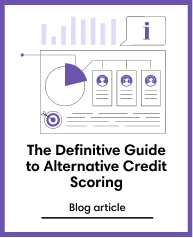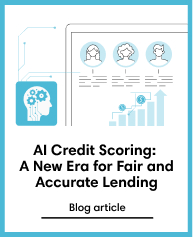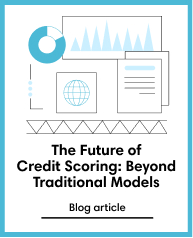Credit Scoring
Feb 21, 2022
Alternative Credit Scoring: The Future Standard for Banks
Subscribe to our newsletter
Introduction
Traditional credit scoring systems, such as Fair Isaac Corporation (FICO) or VantageScore, rely heavily on a narrow set of financial indicators like repayment history, credit utilisation, and length of credit history.
While these metrics have served banks and lenders for decades, they leave millions of individuals, often those without traditional financial footprints, excluded from financial opportunities.
That is where alternative credit data steps in. By evaluating behavioural patterns, payment habits, and digital activity, lenders can better understand borrower risk and expand access to credit.
So, an alternative credit refers to any data used for credit decisions that does not come from traditional credit reports. And it has reshaped financial inclusion for the better.
What Is Alternative Credit Scoring?
Alternative credit scoring is a method of assessing an individual’s creditworthiness using data that goes beyond the traditional credit bureau files.
These scores leverage sources such as mobile usage, utility payments, rental history, and behavioural data gathered from smartphones and apps.
Unlike traditional models, an alternative credit score does not rely solely on past credit behaviour. Instead, it analyses how a person behaves in real time.
For example, smartphone activity, app usage, and even typing patterns can be predictive of repayment reliability.
This approach is especially helpful for the underbanked or those with limited to no formal credit history.
Why Traditional Credit Scores Fall Short
Why are millions of borrowers labelled as "unscorable"? Because they have never used a credit card, taken a loan, or engaged with banks in ways that reflect on credit reports. This includes:
- Millennials and Gen Z individuals
- Immigrants and new-to-country residents
- Gig workers and freelancers
- Cash-based consumers
These individuals may have stable incomes and reliable habits, but still face barriers because traditional credit systems look backwards—at loans, not behaviours. It is a flawed system that penalises the invisible and excludes high-potential borrowers.
Types of Alternative Credit Data Used in Scoring
There are many types that lenders now rely on to evaluate creditworthiness.
As the demand for inclusive lending increases, alternative data for banks becomes essential in complementing traditional scoring models with behavioural, transactional, and contextual insights.
These include utility payments, mobile usage, rental records, and smartphone behaviour—all offering a more complete picture of a borrower's financial reliability.
These include:
- Utility payments (electricity, gas, water)
- Mobile phone usage and top-up history
- Rental payments
- Bank account activity (deposits, balances, spending)
- Digital behaviour and device metadata (how people interact with their phones)
Companies like Credolab specialise in behavioural app data, capturing over 11 million data points to assess risk. For banks exploring alternative data, these signals offer low overlap with traditional credit scores, yet high predictive value.
How Alternative Credit Scoring Works
Here is how it functions in practice:
- A borrower downloads a lender’s app.
- With consent, the app collects anonymised metadata, like screen taps, navigation flow, and app usage.
- These patterns are analysed using machine learning (ML) to predict default probability.
- A credit score is generated and shared instantly with the lender.
This method, known as alternative data lending, offers several benefits:
- No need for paperwork
- Real-time scoring
- Fair access for thin-file borrowers
For instance, Credolab’s mobile solution converts the customer's smartphone metadata into credit scores after obtaining consent to access the data on the device.
This way, the financial capacity of clients is improved while safeguarding their privacy.
For a deeper understanding of how Credolab’s tech functions, visit how Credolab works.
Real-World Use Cases of Alternative Credit Scoring
Credolab has helped over 130 clients assess borrower risk using smartphone data. In Indonesia, a leading bank implemented Credolab’s behavioural scoring tools. Within weeks, results show that:
- Approval rates increased by 107%
- New-to-credit users grew by 61%
- Credit decisions were made in under 5 seconds
These results underline how an alternative credit score can outperform traditional scoring systems. When combined with behavioural signals, it captures nuances that traditional credit checks often miss.
Smartphone metadata adds another layer of insight, enabling more accurate and inclusive credit decisions.
In Indonesia, Credolab partnered with a leading bank to increase loan approvals for first-time banking customers by leveraging alternative credit scoring models.
Over 85% of applicants were previously rejected, so the bank adopted the CredoSDK solution, Credolab's integrated scoring tool for collecting alternative data from smartphones.
The result: a 107% increase in approvals, 61% growth in new users, and a 5-second decision time.
With over 130 clients and 80 million datasets analysed, Credolab enables banks to make faster, smarter, and more inclusive credit decisions.
Similar results have been observed across Latin America, Africa, and Southeast Asia.
These case studies prove that alternative credit score models are not only scalable but also more inclusive and efficient than traditional scoring systems.
To explore additional success stories, read more in Benefits of Credit Risk Management with AI (Artificial Intelligence).
What Are the Key Features of Alternative Credit Scoring?
What are the features of alternative credit? Here are the key standout benefits:
- Inclusivity: Expands financial access to the underbanked
- Real-time analysis: Enables instant decisions
- Privacy-first: Uses anonymised, consented metadata
- Higher predictive power: Models trained on real behaviour
- Low overlap with bureau data: Adds unique value
These features make it ideal for lenders seeking smarter, faster, and more responsible credit assessments.
Banks will be able to distinguish fraudsters from good consumers based on device recognition, context and reputation.
For example, AI algorithms can trigger different alerts when a device is in a location marked as risky, on a blacklist, or similar to a confirmed fraudulent device.
Who Benefits the Most from Alternative Credit Scoring?
The real winners are the groups historically ignored by the credit system:
- Underbanked consumers without accounts or credit cards
- First-time borrowers entering the financial system
- Freelancers and gig economy workers with irregular incomes
- Small businesses without credit files
For these underserved groups, an alternative credit score offers a fairer and more accurate reflection of their financial behaviour. It goes beyond traditional metrics to capture real-world responsibility.
With these methods, borrowers can finally access fair loans and begin building a reliable financial footprint.
Which Lenders Use Alternative Credit Scoring?
Wondering which type of lender is more likely to give you a loan if your credit score is not great? The answer is fintechs and non-traditional lenders. These include:
- Buy-now-pay-later platforms like Afterpay and Klarna
- Peer-to-peer lending platforms
- Neobanks
- Digital microfinance institutions
These lenders adopt agile credit models designed for flexibility and speed. They leverage alternative data to evaluate borrowers beyond traditional credit histories, allowing them to serve populations that traditional banks often overlook.
Their flexibility allows them to evaluate risk using behavioural data, mobile activity, and spending patterns rather than outdated financial records.
This makes them well-suited to serve thin-file borrowers, freelancers, and first-time applicants who traditional banks often reject.
As regulations evolve and demand for inclusive finance grows, these lenders are setting new standards for responsible lending through smarter, data-driven models.
Are Non-Bank Credit Options Using Alternative Data?
Yes. So what are some examples of non-bank credit options?
- BNPL providers using purchase history
- Digital wallets offering overdraft or credit lines
- Mobile lenders targeting emerging markets
- Micro-lending apps providing payday loans based on behavioural data
All of these use alternative credit data to make fast, data-driven decisions. They rely on behavioural signals and real-time insights rather than outdated credit reports.
As a result, they offer short-term credit to users who would not qualify through traditional means.
This shift is particularly important in regions where traditional credit infrastructure is limited or inaccessible.
Non-bank lenders can leverage alternative credit data to assess creditworthiness quickly and responsibly, often using only a smartphone as a means of verification.
By removing sole dependency on credit bureau scores, these platforms expand financial access and support economic inclusion for underserved populations.
Future of Alternative Data in Banking
The next decade will see even deeper integration of alternative data into banking.
Regulators, like the FCRA (Foreign Contribution (Regulation) Act) in the United States (US), are beginning to acknowledge the value of non-traditional credit information. Global standards are emerging to support the ethical and transparent use of data.
Meanwhile, demand for inclusive and real-time credit decisions continues to grow. Credolab is poised to lead this transformation with:
- General Data Protection Regulation (GDPR) and California Consumer Privacy Act (CCPA)-compliant privacy architecture
- Real-time behavioural scoring
- Embedded ML tools for banks and lenders
As banking becomes more digital, alternative data lending will become the new norm.
With central banks and policymakers actively exploring frameworks for responsible data usage, the integration of alternative credit insights into mainstream lending decisions is no longer a fringe trend, but a rapidly emerging policy.
As innovation accelerates, institutions that adopt privacy-first, real-time scoring systems, like Credolab’s, will be better equipped to serve new borrowers, reduce default rates, and stay ahead of compliance shifts in the digital lending space.
Conclusion
Alternative credit data is no longer just a trend—it is the foundation of modern, inclusive, and intelligent lending.
As traditional models struggle to keep pace with evolving borrower behaviour, tools like Credolab’s behavioural scoring offer a timely, privacy-compliant solution.
With real-time insights, ethical data usage, and proven results, lenders can extend credit responsibly, tap into underserved markets, and reduce risk with greater accuracy.
Now is the time for financial institutions to move beyond outdated credit paradigms and embrace the full potential of alternative credit scoring in the digital age.
FAQs
How does financial technology differ from traditional banking methods?
Fintech leverages technology, such as ML and mobile platforms, to deliver services faster and more inclusively than traditional banks, which often rely solely on traditional systems.
In what ways did financial institutions adapt to digital advancements?
They have integrated APIs (Application Programming Interface), digital onboarding, and mobile-first services. Some now use alternative credit scoring to widen their customer base.
What role does the finance team play in managing company spending?
Finance teams use real-time dashboards, predictive analytics, and budgeting tools to oversee expenditures and allocate resources efficiently.
How has technology improved personalisation in financial services?
Data analytics enables hyper-targeted product recommendations based on individual behaviours, spending patterns, and financial goals.
What recent innovations are changing the finance industry?
Embedded finance, behavioural scoring, open banking APIs, and decentralised finance (DeFi) are disrupting traditional models.
Which technologies are transforming the future of banking?
Key technologies include machine learning for credit scoring, blockchain for secure transactions, APIs for seamless integrations and behavioural data tools like Credolab for better risk assessment.





